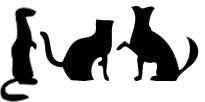Cognitive Dysfunction Syndrome
/Cognitive Dysfunction Syndrome or CDS is a disease we commonly see in our senior and geriatric patients. As their brains age we start to see cognitive decline, their behaviors begin to change in various ways and they require a more extensive level of care. If you have an aging animal who is experiencing signs of CDS talk to your veterinarian. There are options out there. At first the symptoms may be very mild, increasing over time. With dogs we start to classify them senior at approx. 6 years for a large breed dog, and approx. 10 years for smaller breeds like a chihuahua or our feline friends. You can begin to see age related cognitive changes starting around that time. The changes in behavior to look out for are anxiety (ie: barking, panting, pacing, yowling, howling, or meowing excessively), restless broken sleep-especially at night, house soiling, irritability or fearful behavior, some may just stand in a corner disoriented. These symptoms can disrupt the whole household.
It’s important to continue to provide our pets with environmental enrichments as they age. Stimulate their minds and continue to play with them- even if it’s only for a few minutes a day! Puzzle toys filled with treats are always a great idea for animals of any age. Engaging them in a mindful game with a rewarding treat will help keep their minds sharp. Laser lights are also a good idea to get them up and exercising both cats and dogs love that. Cat nip can be a fun way to liven up your cat and get them to engage in a playful exercise. Encourage them to continue to do things they’ve always loved to do! Arthritis can inhibit some of their day to day activities like going for walks but don’t stop taking them out. The distance walked may get shorter and shorter but they still love it. It’s important to get them up and moving and provide them with enrichment that they might not get just moseying around in the backyard. Exercise is not only important mentally but also physically- helps to keep their muscles strong and weight down. Continue to have them do simple commands that they have learned over the years make them sit, lay down, stay, give you their paw ect. Or perhaps even teach them a new trick, it can be done! Dietary changes are also an important part of managing CDS. Starting your pet on an omega-3 fatty acid supplement will do more than just keep their skin moist and beautiful, it alos helps to reduce inflammation as well as keeping the brain healthy and maintaining cognitive function . Purina offers a prescription diet that can help to nutritionally manage CDS, as well as a new probiotic that helps to manage anxiety that they can experience associated with CDS.
An increase in anxiety with our ageing animals is very common. They can become very attached to us and many develop some separation anxiety. This can be difficult to deal with and can be hard on owners emotionally. It’s important to find ways to comfort them when you’re not home. Developing a safe place for them is always a good idea. It can be a closet they like to lay in, a room of their own, or even their crate. When you are home encourage them to go to their safe quiet place and reward them when they do, put items they love in their safe place. Giving them something to distract them when you’re not around is a great idea. Bones and Frozen Kongs can be great distractions. You can fill them with a wide variety of different ingredients to distract them when you’re not home. If you work long hours during the day find a dog walker/ sitter who can visit your home and let them out in the middle of the day. Remember as they age they will need to go out more frequently. It can be stressful to them to have to go to the bathroom will no access to outside. Elderly dogs who have accidents in the house get very embarrassed! With disoriented elderly felines you may want to consider adding a couple of extra litter boxes in the house so your kitty always has a box close to them where ever they are in the house to avoid accidents.
Dealing with a restless dog or cat at night keeping the whole house up can make for an exhausted household. Interrupted sleep cycles can be a sign of stress and disorientation. They may wake you up at night to get some attention and comfort. Pacing back and fourth is common. Sometimes we find them staring into a corner. Other times dogs will howl or a cat will let out this “yowling meow”. Lightly medicating them a bit at night can help relax them- allowing both human and animal to get some “shut eye”! it will be healthier for everyone involved to be on a regular sleep cycle and hopefully get back to their old routine.
CDS can be stressful to deal with for everyone involved, especially the pet. When you bring your pet to see us please mention these behaviors. We can make suggestions that will hopefully help. There are options out there, so if you are experiencing these issues talk with us- you are certainly not alone!
Stay tuned for more senior pet blogs!

